人教版高一英语必修一Unit 3 Travel journalGrammar课件(31张)
文档属性
| 名称 | 人教版高一英语必修一Unit 3 Travel journalGrammar课件(31张) |

|
|
| 格式 | zip | ||
| 文件大小 | 3.4MB | ||
| 资源类型 | 教案 | ||
| 版本资源 | 人教版(新课程标准) | ||
| 科目 | 英语 | ||
| 更新时间 | 2020-02-20 00:00:00 | ||
图片预览


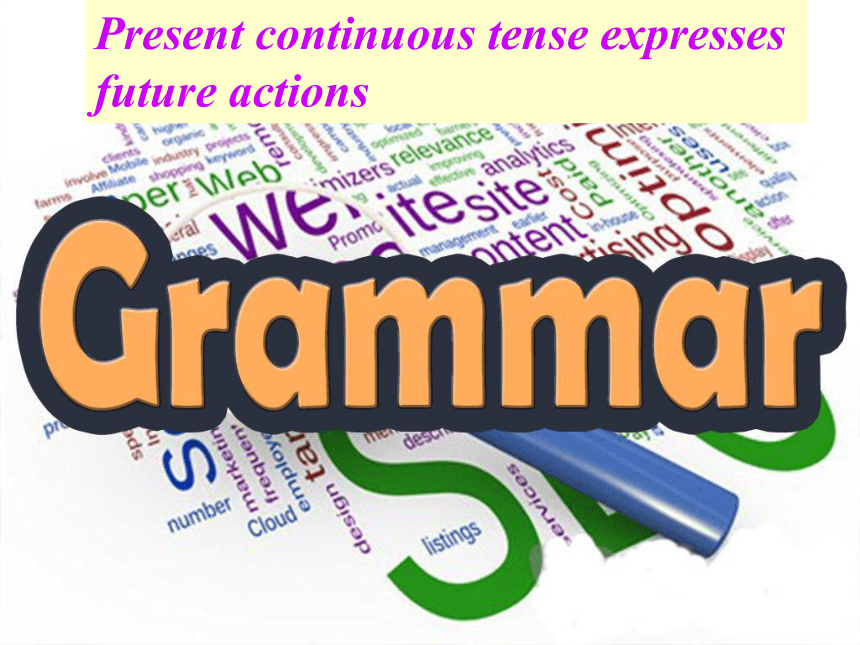

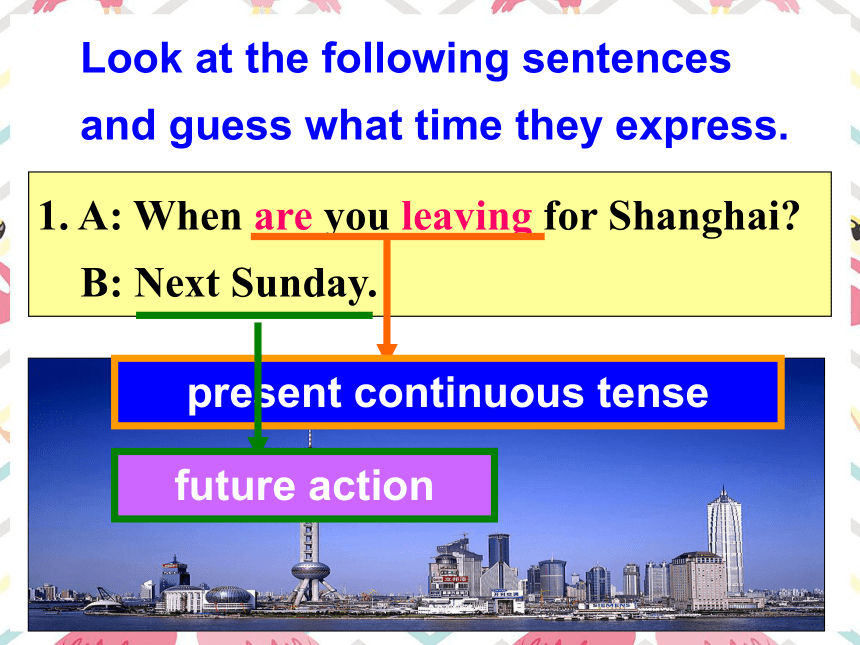
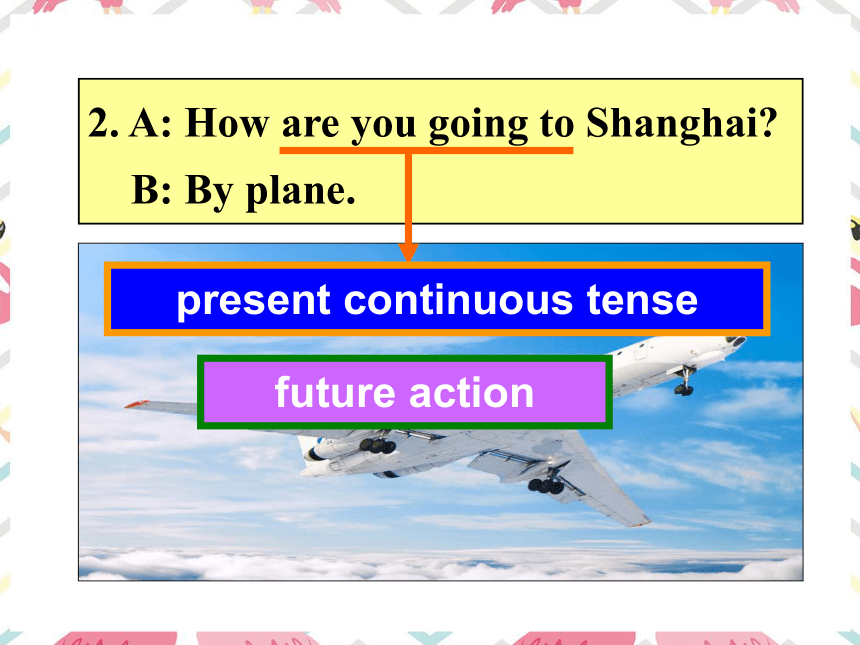

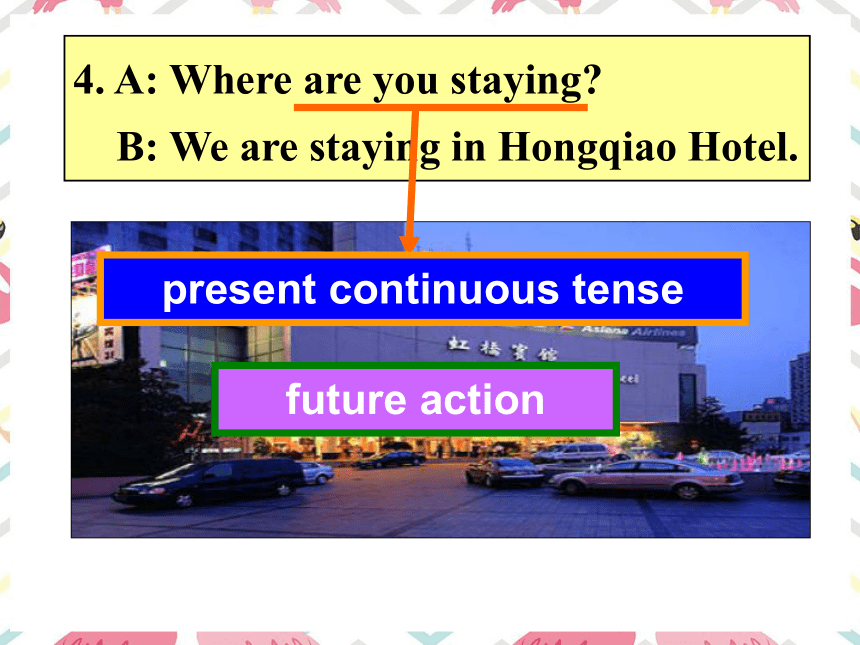

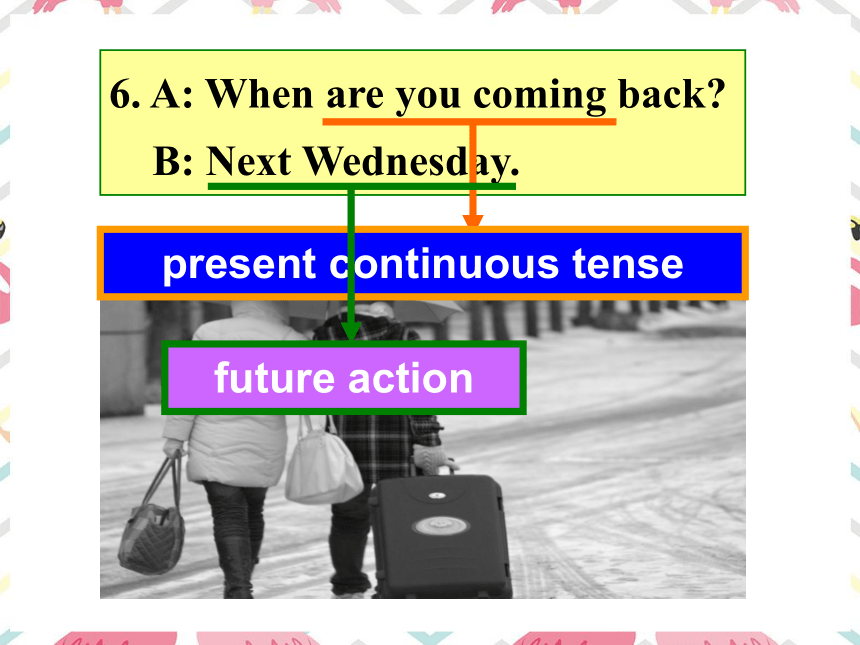
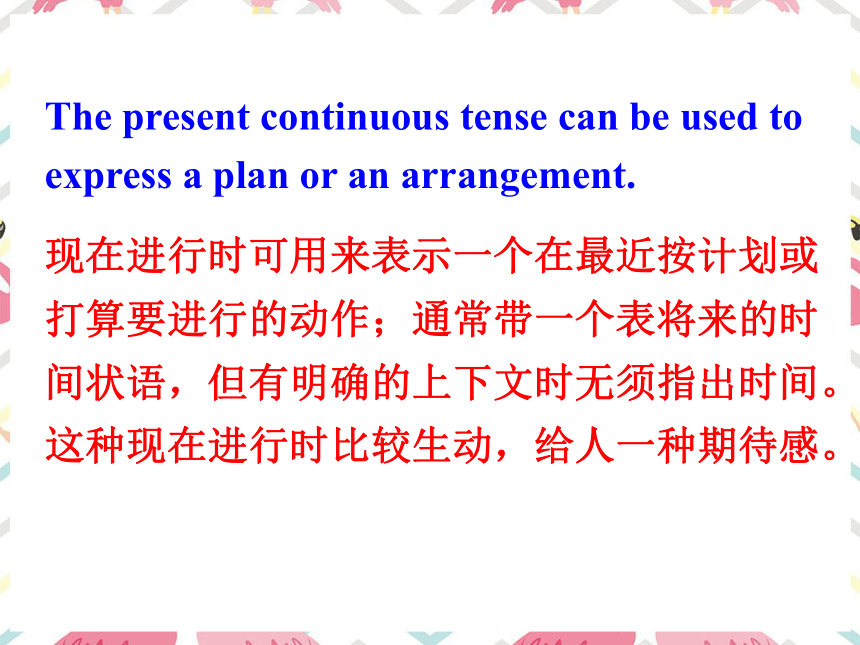

文档简介
课件31张PPT。Unit 3Unit 3
Travel JournalPresent continuous tense expresses
future actionsTo learn and to use the present continuous tense.Look at the following sentences and guess what time they express.present continuous tensefuture actionpresent continuous tensefuture actionpresent continuous tensefuture actionpresent continuous tensefuture actionpresent continuous tensefuture actionpresent continuous tensefuture action现在进行时可用来表示一个在最近按计划或打算要进行的动作;通常带一个表将来的时间状语,但有明确的上下文时无须指出时间。这种现在进行时比较生动,给人一种期待感。The present continuous tense can be used to express a plan or an arrangement.现在进行时也可用在时间或条件状语从句中表“将来” 。
用于此结构的多是转移动词, 但也有部分非转移动词。
e.g. You can do some reading when you
are waiting for the train.
If he’s still waiting, tell him to go
home. In the following dialogue, a newspaper reporter is interviewing Wang Wei about her plans for the trip along the Mekong River. However, they are not sure about some of the verb tenses. Please complete their conversation. R: Miss Wang, I hear that you _____
_________ (travel) along the Mekong River. Have you got everything ready?
W: Almost.
R: So when ____ you _______ (leave)?
W: Next Monday.
R: How far ____ you _______ (cycle) each day?are are leaving are cyclingtravellingW: It’s hard to say. If the weather is fine, I think we’ll be able to ride 75 km a day.
R: What about the weather in Qinghai
Province?
W: The weather forecast is not good so we __________ (take) a large parcel of warm clothes with us.
R: Where ___ you _______ (stay) at night? are taking are stayingW: Usually in our tent, but sometimes in the villages along the river bank.
R: What happens if you have an accident?
W: Don’t worry. I had some medical training at my college. Besides, we _________ (take) out insurance to cover any problems.
R: Well, it sounds fun. I hope you’ll have a pleasant journey. Thank you for your time. are taking1. will / shall +动词原形2. be going to +动词原形3. be to +动词原形4. be about to +动词原形5. 一般现在时表将来表将来1) shall (第一人称),will (各种人称)
e.g. I shall be seventeen years old
next month.
2) will表较远的不确定的将来,事物的固有属性,或临时性决定的事件。
e.g. Fish will die without water.
You go first. I’ll follow you.1. will / shall +动词原形计划打算做的事;根据现在对未来推断;过
去本打算但没有做的事。
e.g. We are going to have a meeting today.
Look at the dark clouds. It is going to
rain.
—Tom, you didn’t come to the party last night?
—I was going to, but I suddenly remembered I had homework to do.2. be going to +动词原形计划、安排;应该、可能;想,打算e.g. His daughter is to get married soon.
You are to report it to the police.
If we are to be there before ten, we’ll have to go now.3. be to +动词原形即将发生的动作, 不与表示将来的具体时间状语连用。
e.g. The train is about to start.4. be about to +动词原形1) come, go, leave, move, start, return,
arrive, begin, stay等动词表示的是
____, _____ 等 _______时,用一般
现在时表将来。
e.g. The plane ________ at 10:10. That
is, it’s leaving in ten minutes.航班轮船时间表takes off5. 一般现在时表将来2) 用在 _________ 中用一般现在时代替
将来时。
e.g. If you ___ that again, I’ll hit you.3) 用在 _____ 和 ______ 后面, 常用一般
现在时表将来。
e.g. I bet you ____________ before
ten tomorrow.
我敢说你明天不到10点是不会起床
的。状语从句doI betI hopedon’t get up注意: 表“状态和感官”的动词通常不用于进行时:现在进行时除表示正在进行的动作之外,还可表示将来,常有“意图”、“安排”或“打算”的含义。用现在进行时或一般现在时补全下面对话。
Emma:?Are you doing anything tonight?
Jerry:?Yes, I 1. ________ (go) to the station to meet my friend Richard. He 2. ________ (stay) here for the weekend, remember? His train 3. ________ (get) in at eight fifteen.
Emma:?Oh, of course. I’d forgotten about that.
Jerry:?Maybe we’ll see you later. What are you doing tonight?am goingis stayinggetsEmma:?Oh, I 4. ________ (go) to the cinema with Vicky and Rachel and a couple of other people. The film 5. ________ (finish) quite early, so we 6. ________ (go) to a pizza place afterwards.
Jerry:?I wish you a good time.
Emma:?Thank you.am goingfinishesare goingYou have got some plans for next week. Use the present continuous tense to express your future actions. Give as much information as you can.I’m going out this evening.
I’m not doing anything this evening.
I don’t know what I’m doing this evening.
Travel JournalPresent continuous tense expresses
future actionsTo learn and to use the present continuous tense.Look at the following sentences and guess what time they express.present continuous tensefuture actionpresent continuous tensefuture actionpresent continuous tensefuture actionpresent continuous tensefuture actionpresent continuous tensefuture actionpresent continuous tensefuture action现在进行时可用来表示一个在最近按计划或打算要进行的动作;通常带一个表将来的时间状语,但有明确的上下文时无须指出时间。这种现在进行时比较生动,给人一种期待感。The present continuous tense can be used to express a plan or an arrangement.现在进行时也可用在时间或条件状语从句中表“将来” 。
用于此结构的多是转移动词, 但也有部分非转移动词。
e.g. You can do some reading when you
are waiting for the train.
If he’s still waiting, tell him to go
home. In the following dialogue, a newspaper reporter is interviewing Wang Wei about her plans for the trip along the Mekong River. However, they are not sure about some of the verb tenses. Please complete their conversation. R: Miss Wang, I hear that you _____
_________ (travel) along the Mekong River. Have you got everything ready?
W: Almost.
R: So when ____ you _______ (leave)?
W: Next Monday.
R: How far ____ you _______ (cycle) each day?are are leaving are cyclingtravellingW: It’s hard to say. If the weather is fine, I think we’ll be able to ride 75 km a day.
R: What about the weather in Qinghai
Province?
W: The weather forecast is not good so we __________ (take) a large parcel of warm clothes with us.
R: Where ___ you _______ (stay) at night? are taking are stayingW: Usually in our tent, but sometimes in the villages along the river bank.
R: What happens if you have an accident?
W: Don’t worry. I had some medical training at my college. Besides, we _________ (take) out insurance to cover any problems.
R: Well, it sounds fun. I hope you’ll have a pleasant journey. Thank you for your time. are taking1. will / shall +动词原形2. be going to +动词原形3. be to +动词原形4. be about to +动词原形5. 一般现在时表将来表将来1) shall (第一人称),will (各种人称)
e.g. I shall be seventeen years old
next month.
2) will表较远的不确定的将来,事物的固有属性,或临时性决定的事件。
e.g. Fish will die without water.
You go first. I’ll follow you.1. will / shall +动词原形计划打算做的事;根据现在对未来推断;过
去本打算但没有做的事。
e.g. We are going to have a meeting today.
Look at the dark clouds. It is going to
rain.
—Tom, you didn’t come to the party last night?
—I was going to, but I suddenly remembered I had homework to do.2. be going to +动词原形计划、安排;应该、可能;想,打算e.g. His daughter is to get married soon.
You are to report it to the police.
If we are to be there before ten, we’ll have to go now.3. be to +动词原形即将发生的动作, 不与表示将来的具体时间状语连用。
e.g. The train is about to start.4. be about to +动词原形1) come, go, leave, move, start, return,
arrive, begin, stay等动词表示的是
____, _____ 等 _______时,用一般
现在时表将来。
e.g. The plane ________ at 10:10. That
is, it’s leaving in ten minutes.航班轮船时间表takes off5. 一般现在时表将来2) 用在 _________ 中用一般现在时代替
将来时。
e.g. If you ___ that again, I’ll hit you.3) 用在 _____ 和 ______ 后面, 常用一般
现在时表将来。
e.g. I bet you ____________ before
ten tomorrow.
我敢说你明天不到10点是不会起床
的。状语从句doI betI hopedon’t get up注意: 表“状态和感官”的动词通常不用于进行时:现在进行时除表示正在进行的动作之外,还可表示将来,常有“意图”、“安排”或“打算”的含义。用现在进行时或一般现在时补全下面对话。
Emma:?Are you doing anything tonight?
Jerry:?Yes, I 1. ________ (go) to the station to meet my friend Richard. He 2. ________ (stay) here for the weekend, remember? His train 3. ________ (get) in at eight fifteen.
Emma:?Oh, of course. I’d forgotten about that.
Jerry:?Maybe we’ll see you later. What are you doing tonight?am goingis stayinggetsEmma:?Oh, I 4. ________ (go) to the cinema with Vicky and Rachel and a couple of other people. The film 5. ________ (finish) quite early, so we 6. ________ (go) to a pizza place afterwards.
Jerry:?I wish you a good time.
Emma:?Thank you.am goingfinishesare goingYou have got some plans for next week. Use the present continuous tense to express your future actions. Give as much information as you can.I’m going out this evening.
I’m not doing anything this evening.
I don’t know what I’m doing this evening.
